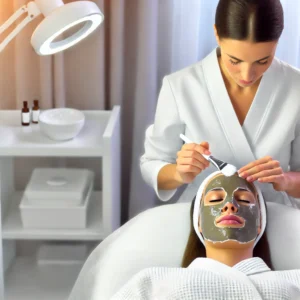Scaling and polishing are routine dental procedures that help maintain the health of your teeth and gums by removing plaque, tartar (calculus), and surface stains. These procedures are essential components of preventive dental care, aimed at keeping teeth clean, preventing gum disease, and promoting overall oral health.
What is Scaling?
- Scaling is a deep cleaning procedure performed by a dentist or dental hygienist to remove plaque and tartar buildup from the surface of teeth and below the gum line. Tartar is hardened plaque that cannot be removed by regular brushing and flossing, and scaling is necessary to eliminate it.
- Procedure:
- Manual Instruments: The dentist may use a hand-held tool called a scaler to scrape away tartar from the tooth surfaces.
- Ultrasonic Scalers: Alternatively, an ultrasonic scaler may be used. This tool uses high-frequency vibrations and a stream of water to dislodge and wash away tartar. The vibrations help break up tartar deposits, while the water flushes out debris.
What is Polishing?
- Polishing is a procedure performed after scaling to smooth the tooth surfaces and remove surface stains. It helps to make the teeth shiny and smooth, making it more difficult for plaque to adhere.
- Procedure:
- Prophylaxis Paste: A special gritty toothpaste called prophy paste is used with a rotating rubber cup or brush to polish the teeth. The paste helps remove minor surface stains and give teeth a shiny, clean appearance.
- Air Polishing: In some cases, air polishing may be used. This method involves a jet of compressed air, water, and an abrasive powder to remove stains and polish teeth.
Benefits of Scaling and Polishing
- Prevents Gum Disease: Scaling removes tartar from above and below the gum line, which helps prevent gingivitis and periodontitis. Tartar buildup can irritate the gums and lead to inflammation and gum disease.
- Reduces Bad Breath: Plaque and tartar can harbor bacteria that cause halitosis (bad breath). Scaling and polishing remove these deposits, resulting in fresher breath.
- Improves Oral Hygiene: Polishing helps smooth the surface of the teeth, making it more difficult for plaque to stick, and making it easier to maintain good oral hygiene.
- Removes Stains: Polishing helps remove minor surface stains from food, drinks, and smoking, improving the aesthetic appearance of your smile.
How Scaling and Polishing are Done
- Examination: The dentist or hygienist will first examine your teeth and gums to identify any areas with significant tartar buildup or other dental issues.
- Scaling: The scaler, either manual or ultrasonic, is used to remove plaque and tartar from all tooth surfaces. Special attention is given to areas just below the gum line, as this is where tartar tends to accumulate and cause gum problems.
- Polishing: After scaling, the dentist or hygienist will polish the teeth using a rotary tool with a soft rubber cup filled with prophy paste. The rotating cup moves over each tooth, polishing away any surface stains and leaving the teeth smooth and shiny.
- Flossing and Rinsing: Finally, the teeth are flossed to remove any leftover debris, and the patient is asked to rinse their mouth thoroughly.
Who Needs Scaling and Polishing?
- Everyone should undergo scaling and polishing regularly as part of their oral care routine.
- People with Gum Disease: Individuals with signs of gum disease, such as bleeding gums, inflammation, or bad breath, can benefit significantly from scaling and polishing.
- Those with Tartar Buildup: People who tend to accumulate tartar more quickly, even with regular brushing and flossing, should consider scaling and polishing more frequently.
- Smokers or Coffee Drinkers: Those who smoke or frequently consume coffee, tea, or red wine may benefit from polishing to remove stains and maintain a brighter smile.
Frequency of Scaling and Polishing
- Every 6 Months: For most people, scaling and polishing should be done every six months as part of their routine dental check-up.
- More Frequently: People with gum disease, rapid tartar buildup, or orthodontic appliances may need to undergo scaling and polishing more frequently, as advised by their dentist.
Does Scaling and Polishing Hurt?
- Scaling and polishing are generally painless procedures, especially if done regularly. However, some people may experience slight discomfort or sensitivity, particularly if they have sensitive gums or significant tartar buildup.
- Anesthesia: For patients with gum disease or who are anxious about the procedure, the dentist may apply a local anesthetic or a numbing gel to ensure comfort during scaling.
Aftercare for Scaling and Polishing
- Oral Hygiene: Continue to brush your teeth twice a day and floss daily to keep plaque and tartar at bay.
- Fluoride Toothpaste: Use a fluoride toothpaste to help protect your enamel and prevent decay.
- Mild Sensitivity: Some mild sensitivity to hot or cold foods and drinks may be experienced after scaling. This usually subsides within a few days. Using toothpaste for sensitive teeth can help reduce discomfort.
- Rinse with Warm Salt Water: Rinsing with warm salt water can help soothe gums and reduce any minor discomfort after scaling and polishing.
Advantages of Regular Scaling and Polishing
- Prevents Tooth Decay: Removing plaque and tartar helps prevent cavities and tooth decay.
- Maintains Healthy Gums: Regular scaling and polishing prevent the onset of gum disease, keeping gums healthy and reducing the risk of periodontitis.
- Brightens Your Smile: Polishing helps remove surface stains and gives your teeth a brighter appearance, which can enhance the aesthetics of your smile.
- Improves Overall Health: Oral health is linked to overall health. Regular dental cleanings can help reduce the risk of other health conditions, such as cardiovascular disease, that have been linked to poor oral hygiene.
Risks of Not Getting Scaling and Polishing
- Gum Disease: Without regular scaling, tartar can build up below the gum line, causing gingivitis (gum inflammation) and potentially leading to more severe periodontitis.
- Cavities: Plaque buildup that is not removed can lead to the formation of cavities, which may require fillings or more extensive treatments.
- Tooth Loss: Advanced gum disease resulting from neglected oral hygiene can lead to tooth loss due to the destruction of the supporting bone and tissues.
- Bad Breath: The bacteria in plaque and tartar can lead to bad breath, which can be persistent without proper cleaning.
Scaling and polishing are vital dental procedures that help maintain good oral health by removing harmful plaque and tartar, preventing gum disease, and keeping teeth clean and shiny. Regular cleanings every six months, along with proper oral hygiene at home, will help ensure a healthy mouth and reduce the risk of cavities, gum disease, and other dental issues. Maintaining a consistent dental care routine that includes scaling and polishing can significantly improve your oral health and contribute to a brighter, healthier smile.
Other Services
- Esthiderm facial with Baby Botox Mesotherapy
- Radio frequency for lifting and infusing collagen
- Esthiderm facial with lifting mask
- Hair Scalp HydraFacial
- Root Strengthening and Hair Growth Treatment
- Hair Loss Treatment
- Meso Therapy
- Meso Botox
- Chemical Peeling
- Aqua Gold
- PRP
- Dark Circles
- Pigmentations
- Instant Glow Vitamins
- Open Pores
- Acne Scars
- Intensive Hyaluronic Treatment
- Intensive Vitamin C Treatment
- Black & White heads removal (Manual extraction)
- Hydrafacial (With Microdermabrasion)
- OxyGeneo Treatment
- HYDRAFACIAL WITH DETOX
- HYDRAFACIAL WITH VITAMINS
- DEEP HYDRAFACIAL
- Male laser Hair Removal
- Female hair removal laser
- INVISALIGN
- FLOURIDE APPLICATION
- ZIRCONIA CROWNS, BRIDGES
- NIGHT GUARD
- SIMPLE EXTRACTIO
- SURGICAL EXTRACTION
- ROOT CANAL TREATMENT (RCT)
- VENEERS PER TOOTH
- FILLINGS
- SNAP ON SMILE (UPPER/LOWER)
- Home kit whitening
- Retreatment
- NANO TEETH WHITENING



